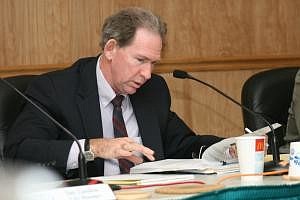- April 23, 2024
-
-
Loading

Loading

A dispute over trees in and around the Palm Harbor Shopping Center has reached a boiling point.
In August, Dennis McDonald, a Palm Coast resident and former candidate for the Flagler County Commission, filed an injunction against the city of Palm Coast, saying its plans to remove trees are illegal.
The city has since filed a motion to dismiss the injunction before Circuit Court Judge Dennis Craig. The motion is tentatively scheduled for 10 a.m. Jan. 27, at the Kim C. Hammond Justice Center, in Bunnell.
In addition, the city has filed a motion for sanctions against McDonald, essentially asking the court to make McDonald pay for the city’s costs of fighting the injunction, which includes attorney fees and staff time.
In the motion for sanctions, the city, through its legal team, states that the allegations are false and unsupported, the allegations are not supported by existing law, and the element of injunctions are not met.
The motion for sanctions gives McDonald 21 days to withdraw or correct his filed injunction.
But Joshua Knight, the attorney representing McDonald, said Tuesday that the city’s move to motion for sanctions is a “scare tactic.”
“No reason to overly sensationalize the motion for sanction,” Knight said in an email. “In my opinion, it’s a scare tactic to withdraw the temporary restraining order.”
McDonald, in his injunction, claims the city is violating its own covenants by cutting down certain trees.
Bill Reischmann, the city’s attorney, said the covenants attached to the complaint deal with property that is west of Interstate 95. The Palm Harbor Shopping Center is located east of Interstate 95.
Reischmann said private covenants and restrictions don’t apply to governments. Instead, he said, the city enforces its land development code and comprehensive plan.
“It’s apple and oranges,” Reischmann said. “(McDonald) is asking us to do something we don’t have the power to do. He’s suing the wrong people.”
Additionally, in the motion for sanctions, the city states that McDonald appears to complain that trees will be removed from private property. But McDonald hasn’t sued any private property owner, the motion states.
“If (McDonald) believes Dunkin Donuts, or Wells Fargo, or the shopping center is or will be removing trees in violation of an inapplicable document, then (McDonald) should sue these private property owners, not the city of Palm Coast,” the motion states.
Knight said the city’s response will help him move forward.
“The city’s response was somewhat relevatory in that it helped us refine the score of our case ... exactly what we were hoping for,” Knight said. “There’s a hearing on the city’s motion to dismiss set for the end of January, which gives us plenty of time to amend or withdraw.”
Reischmann said attorneys rarely file motions for sanctions, calling it “unusual.”
“We do it reluctantly,” Reischmann said. “But when the city gets sued like this, it has to pay its attorneys; it has to use tax dollars to pay lawyers. The motion for sanctions is to try to do the right thing. Why should citizens have to pay to defend this kind of lawsuit?”